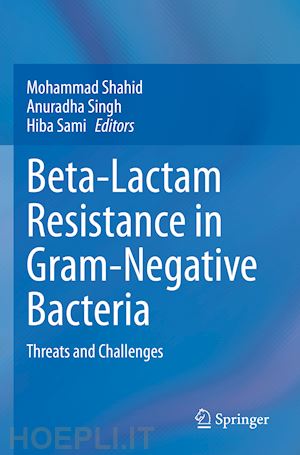
Questo prodotto usufruisce delle SPEDIZIONI GRATIS
selezionando l'opzione Corriere Veloce in fase di ordine.
Pagabile anche con Carta della cultura giovani e del merito, 18App Bonus Cultura e Carta del Docente
This timely book discusses antimicrobial drug resistance, specifically, the resistance against the beta-lactam class of antibiotics by Gram-Negative bacteria. The book is broadly divided into five sections. The first section describes the underlying mechanisms of antimicrobial resistance in Gram-negative bacteria. It gives an insight into the beta-lactamases, their types, classification, inhibitors, etc. The second section delves deep into the genetic basis of resistance. It talks about transposons, integrons, insertion sequences associated with antibiotic-resistant genes. The next section describes phenotypic and molecular methods to detect beta-lactam resistance. The fourth section talks about the epidemiology and prevalence of beta-lactamases in the environment. The last section of the book describes the various therapeutic options to combat this growing public threat of antimicrobial resistance. It talks about the current reserve drugs, as well as the newer antibiotic agents that are in the pipeline.
This book is essential for clinical practitioners, students, and researchers in basic and medical microbiology.
Dr. Mohammad Shahid is a Professor & Chairman in the Department of Microbiology, Immunology & Infectious Diseases of the College of Medicine & Medical Sciences of Arabian Gulf University, Kingdom of Bahrain. Before joining the Medical College in Bahrain, he held the Chair of Department of Microbiology, JN Medical College & Hospital of Aligarh Muslim University, Aligarh, India, during 2017–2019. He did his MBBS, MD (Microbiology), and PhD (Microbiology) from JN Medical College & Hospital of Aligarh Muslim University, Aligarh, India, in years 1995, 2000, and 2008, respectively. He holds the professional registration of Medical Sciences Council of New Zealand and is a Fellow of New Zealand Institute of Medical Laboratory Sciences. He is a Commonwealth Academic Fellow (UK) and has affiliate membership of Royal College of Pathologists of Australasia (RCPA). He also worked as Visiting Scholar (Research) in West Midlands Public Health & Birmingham HeartlandsNHS Hospital, Birmingham, UK, and as an Honorary Research Fellow in Antimicrobial Agents Research Group, Institute of Biomedical Research, The Medical School, University of Birmingham, UK. He has authored 6 books, 19 book chapters, and more than 100 scientific papers in various national and international journals of high repute. He holds membership of various professional bodies including American Society for Microbiology (ASM), Infectious Diseases Society of America (IDSA), New Zealand Institute of Medical Laboratory Sciences (NZIMLS), and Royal College of Pathologists of Australasia (RCPA). He sits in the international advisory panel and editorial boards of numerous international journals of high repute.
Dr Anuradha Singh is a research fellow in the ICMR Project and currently affiliated to JNMC, AMU. She was awarded Young Scientist project by Scientific and engineering Research Board (SERB), a three-year duration Project at JNMC, AMU, in the year 2013. Shewas awarded Ph.D. degree in Microbiology in the year 2012. After completing her PhD, she worked as Junior Research Fellow in DST funded project on “Screening of Antimalarial drug resistance genes in Plasmodium falciparum” at Parasitology lab, Department of Microbiology, JNMC, AMU. She has published several scientific publications in National and International journals in her field of research.
Dr Hiba Sami has completed her MBBS in 2010 and MD Microbiology in 2013. She has a teaching and research experience of more than 9 years. She has 20 papers published in index journals (14 International /6 National). She underwent a molecular training in the virology lab at the Institute of Liver And Biliary Sciences, New Delhi. She is a life member of Indian Association of Medical Microbiologist (IAMM) and Hospital Infection Society, India.











Il sito utilizza cookie ed altri strumenti di tracciamento che raccolgono informazioni dal dispositivo dell’utente. Oltre ai cookie tecnici ed analitici aggregati, strettamente necessari per il funzionamento di questo sito web, previo consenso dell’utente possono essere installati cookie di profilazione e marketing e cookie dei social media. Cliccando su “Accetto tutti i cookie” saranno attivate tutte le categorie di cookie. Per accettare solo deterninate categorie di cookie, cliccare invece su “Impostazioni cookie”. Chiudendo il banner o continuando a navigare saranno installati solo cookie tecnici. Per maggiori dettagli, consultare la Cookie Policy.